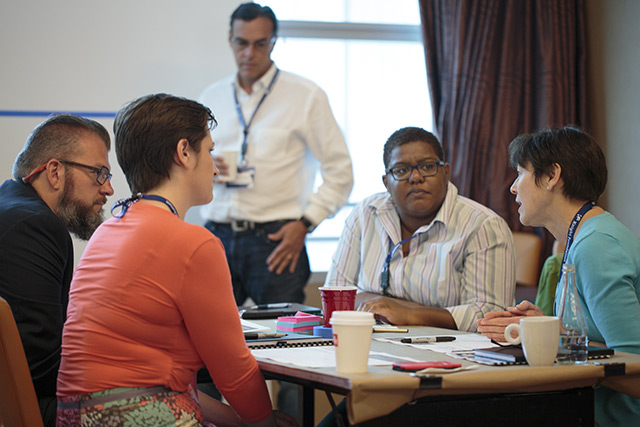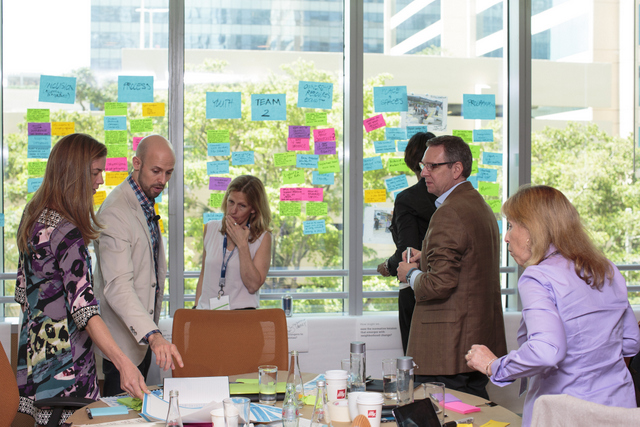
Harnessing talent helps develop full potential of cities
Bryan Boyer, third from left, is a partner at Makeshift Society, a co-working space in Brooklyn and San Francisco, and Dash Marshall, a design studio focused on buildings and the spaces between them. He was a recent facilitator at Knight Foundation’s Civic Innovation in Action Studio in Miami, which explored ways to harness talent, advance opportunity and promote robust engagement. Photos by Tom Carver for Knight Foundation.

Related Links
“More power to the people: Understanding what moves civic engagement” by Kate Catherall on Knight Blog
“Insights from civic innovation studio evolving into action” by Carol Coletta on Knight Blog
“Civic leaders offer ideas for revitalizing neighborhoods” by Sarah Goodyear on Knight Blog
At some point during the opening of Knight Foundation’s Civic Innovation in Action Studio all of the toilets at Makeshift Society in Brooklyn clogged up and began to flood. It was a useful reminder that even when we’re thinking about big changes in our society and economy, the smallest of details still matter. Then I called a plumbing company and begged them to rush to the scene.
Over the subsequent two days several small groups brainstormed ways of “harnessing talent” in America. In short, how do we make the most of the talent that we already have? Can we imagine an American future where a broad number of people make a fair living by doing work that is fulfilling to them? As more people work independently — especially the laid-off and the “downsized” — how do we as a society afford them the same opportunities that have traditionally flowed from employers? For that matter, are jobs a useful end-goal, or do we have other ways to ensure a thriving society without perpetuating the mass-produced assumptions of the industrial era?
To aid Knight Foundation and its guests in thinking about how to harness talent, I set out to learn from those who were freelancing. I spent the first four months of the year interviewing and getting to know freelancers in five cities across the country and one of the things I learned was that people of all walks of life are taking the courageous step to work independently.
I discovered that independent workers are not rebels who have a hard time holding down a full-time gig; they’re optimizing for something other than job stability. Whether it’s a decision to care for an elderly parent or to take time to shift careers to something more meaningful, going solo allows independent workers greater agency as they balance multiple priorities.
Nor are all independents working by themselves big companies just waiting to happen. The independents I met worked in fields ranging from interior design to business consulting and many of them had little interest in growing too much. Instead, they were more interested in building a healthy business that enables them to keep the freedoms they wouldn’t have in traditional employment. These people are enterprising, yet curiously, they’re likely to shy away from the term “entrepreneur.”

In the harnessing talent studio this word evoked strong associations with technology startups. Some massive quotient of innovation is evident in the products of tech companies, but what about innovations in accounting, in hair salons, in door handles? How can we be innovative in the mundane things like condo associations and in deeply social needs such as preparing our children for a productive and happy life?
While this is certainly a question of economic opportunity, it’s also about the future of our cities. Innovation and entrepreneurship do not only happen in the cloud; they can and do happen on the ground. I have no romanticism for brick-and-mortar businesses — or crummy plumbing, for that matter — but I do care about the quality of our cities. If the only place to maximize the use of our talent is while breathing the rarefied air of a startup, we’re raising a high barrier for a significant number of people and missing an opportunity to bring the same innovative spirit to ventures that have deep and necessary connections to our sidewalks, our neighborhoods and our regions. The fact is that many of those businesses are small, and may never be more than medium.
What’s at stake in our attempt to harness talent in America is not just economic development, but the opportunity to have cities and an economy that innately give us the flexibility we need to pursue a full panoply of American Dreams.
View summaries of the work on harnessing talent, advancing opportunity and promoting robust engagement.
Recent Content
-
Community Impactarticle ·
-
Community Impactarticle ·
-
Community Impactarticle ·


